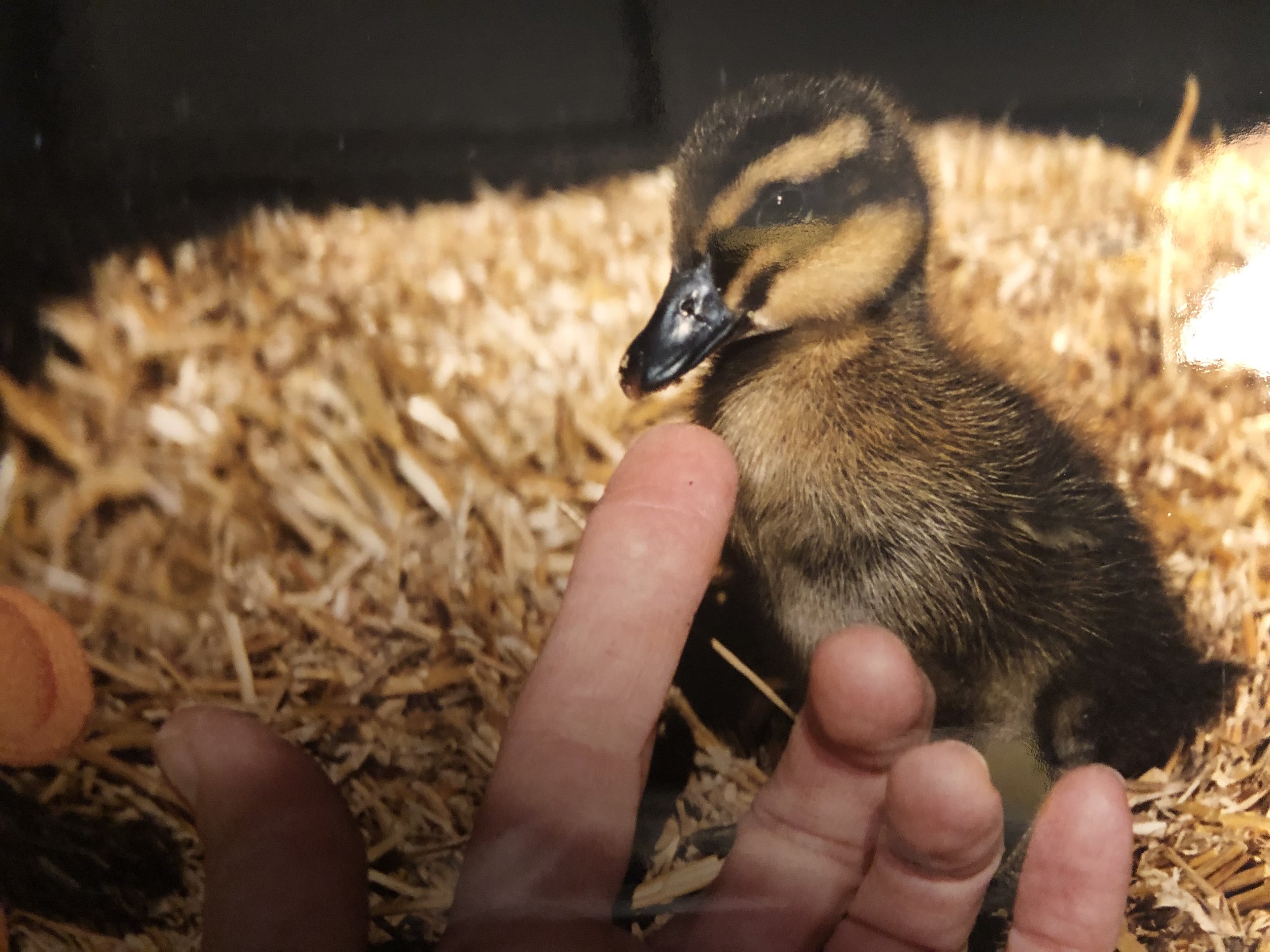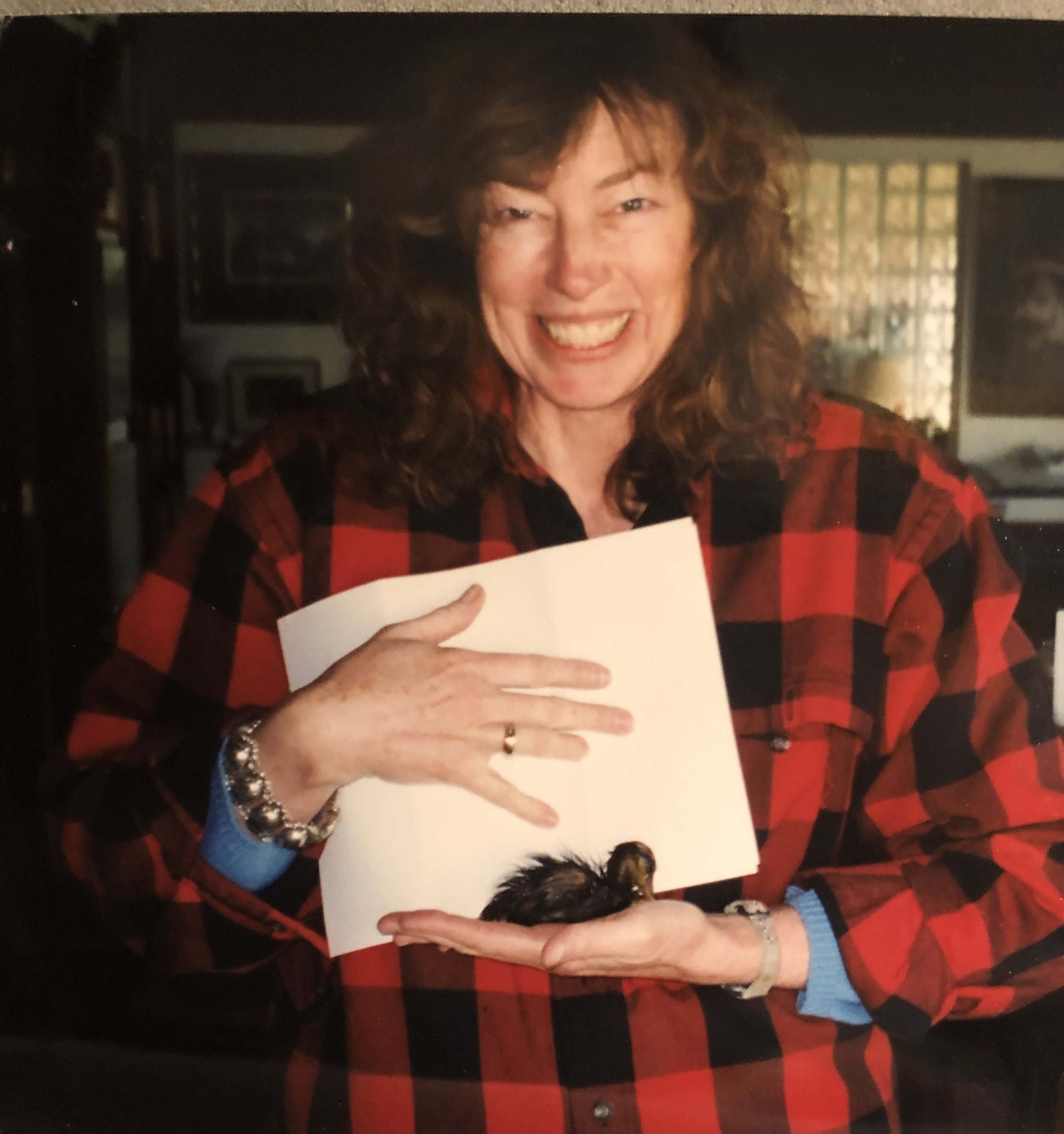A Duckling Named Gilbert
The universe is full of magical things that connect us across time. Like tiny stars, they sparkle bright. When I look up into the heavens on clear November nights, I realize that their story is part of mine. It was on just such a night recently that I was carried back to a spring day in 1995 when Kit and I lived at Breakfast Creek. Rain was falling on the roof of the chicken house behind the barn—a cozy world lit by two heat lamps that provided a sense of security and warmth for the spring flock of ducklings and goslings I’d purchased a month earlier from the Cackle Hatchery in Lebanon, Missouri. All but one, that is. So begins the story of a duckling named Gilbert.
Gilbert M. Grosvenor, President of the National Geographic Society at the time, stayed with Kit and me at the Creek while giving a talk at the University of Missouri. While walking down by our pond, he spotted a couple of abandoned eggs in the pasture grass and asked if my flock had ever built nests and successfully hatched their own eggs. “Never has happened,” I noted. “They were all from a hatchery and mailed to me when they were a day old. I raise them in my chicken house until they grew their feathers. I had to teach them to swim before introducing them to the pond.”
After the visit, Gil sent me a portable incubator as a gift. Before long, I gathered a handful of duck eggs from the pasture, brought the incubator into our sunroom, marked one side of each egg with an X as instructed, closed the lid, and turned their “nest” on. As it began rotating gently from side to side, warming the egg evenly, I walked out of the room and patiently waited. Gilbert arrived on the scene 28 days later.
I was working at my desk in the library next to the sunroom when one of the eggs cracked and a tiny duckling let out its first “PEEP!” I immediately ran toward the sound, opened the lid of the incubator, and found a tiny duckling staring into my face. “Gilbert!” I cried as I pulled him from the incubator that had been his protective shell for almost a month. Like all babies, Gilbert emerged wet and wrinkled, unable to hold his neck upright or stand without wobbling. When our eyes locked, he all but cried “Mom!”
The imprinting was instantaneous and complete. My first mission was to find a place for him to grow over the next five to six weeks. The house and barn were cat territory where he would literally be a sitting duck. That left the chicken house already populated by a dozen ducklings still several weeks from graduating to life on our pond. By adding two bales of straw set at right angles in a windowed corner of the chicken house, I solved the shared space problem. Gilbert had his own cozy area with water, a grain self-feeder, and a heat lamp. The paddling of larger ducklings had the larger space for their feeders and an enamel tub in which they were learning to swim.
A routine quickly evolved. Each morning, I distributed golden straw around the floor of the chicken house and filled the duck feeders with Meat Builder and fresh water. Gilbert would sit atop the straw bales happy as a duck in a mud puddle while watching me completed my chores. So that Gilbert would not be lonely the first week in his new environment, I put a rubber duckie and a Beanie Baby duck toy under his heat lamp. After a week, I moved the straw bales a foot apart and added a chicken wire window so he could observe the activities of the older ducks.
Gilbert’s progress was phenomenal. From day one, he was stroked, held and talked to. When I visited him in the chicken house, he loved pecking at my shiny gold wedding ring. During the day, Gilbert followed me everywhere, slurping pond muck with gusto and nibbling tender grass and wild violets. If I took a step, he took a step. We made a curious pair, my little charge and I, marching in matched step unison on our explorations of his new world. While sitting together on the grass, I explained the meaning of to get one’s ducks in a row, and the terms lame duck and sitting duck.
I also taught him the geography of his origins. “You are a Rouen duck, Gilbert—a mallard variety named after a famous city in France. But if you go to Rouen, beware! Canard et petit pois (duck and peas) are staple fare in French country kitchens. When you are fully grown, I will teach you to weed my vegetable garden and take you swimming in the pond when it’s time for you to join the rest of the flock.
A bit frightened but excited by thoughts of such grand adventures, Gilbert asked, “Will I ever learn to fly like the wild ducks and geese?”
“In time, I promised him, “you will take to the sky…like a duck to water.” But, dear reader, that is another story for another day.






